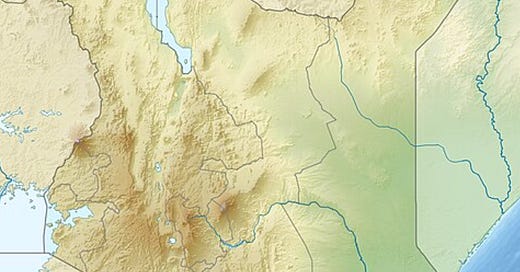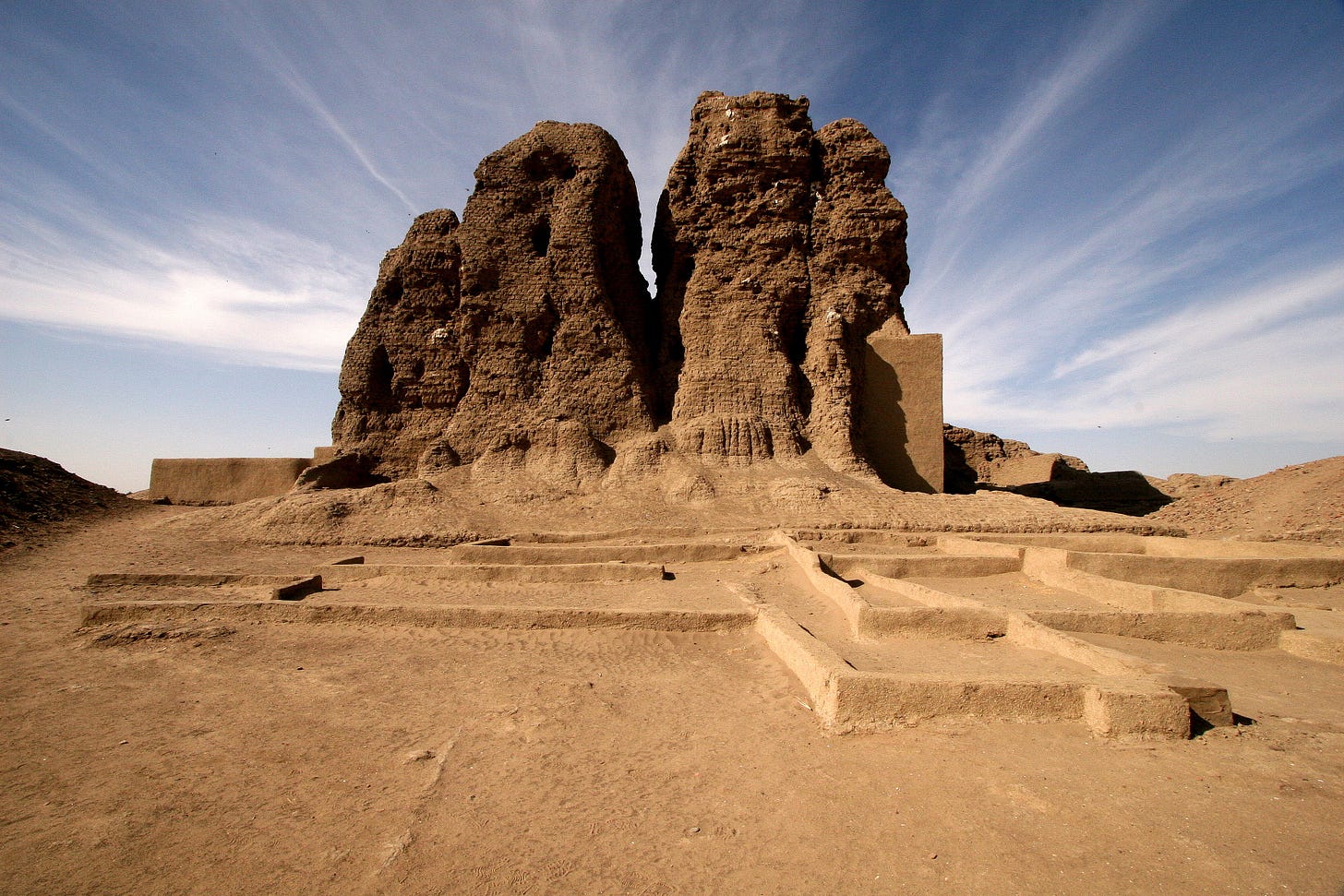🔅 The Cult in the Forest: When Miracles Turn Deadly
A Nigeria-South Africa Feud Hits the Road 🚗 💥
Image of the Day
Market Mondays
Year-to-Date Performance:
🟢 Johannesburg SE: 84,351.57 (+9.70%)
🟢 Nigerian SE: 95,973.45 (+28.35%)
🟢 Nairobi SE: 104.93 (+13.92%)
🟢 Ghana SE: 4,353.38 (+39.08%)
🟢 US S&P 500: 5,634.61 (+18.80%)
🔴 Shanghai Composite: 2,854.37 (-3.64%)
🇬🇭 Analysts predict only modest weakening for Ghana's cedi between now and the December elections, after a rough year due to poor cocoa crop and investor jitters during debt-restructuring talks. Meanwhile, the president launched construction on a 300,000 barrel-per-day oil refinery, with the $12 billion first phase funded by a consortium of companies.
🇺🇸 Global shares jumped on Friday while the dollar languished, after a speech by U.S. Federal Reserve Chair Jerome Powell confirmed the United States would soon begin interest rate cuts.
🇧🇼 Miners in Botswana discovered a massive 2,492-carat diamond, the second-largest stone ever found. Here’s the moment the country’s president feels its weight for the first time.
🇰🇪 Kenya Airways reported its first half-year profit in over a decade, thanks to rising passenger numbers, and is in talks with a potential strategic investor. This as Uber raised fares in Kenya by 10% to better reflect market realities after drivers felt the pinch. The finance minister said some tax measures scrapped after deadly June demonstrations may be revived to fund government expenditure, potentially reigniting protests.
🇿🇦 Qatar Airways acquired a 25% stake in South African regional carrier Airlink, expanding its African footprint and eyeing stakes in Rwanda's RwandAir and a new international airport. Meanwhile, South Africa's inflation fell more than expected in July, hitting a three-year low and fueling expectations for an interest rate cut next month.
🇪🇹 Ethiopia partnered with Dubai's AMEA to develop the Horn of Africa's biggest wind farm, a $620m, 300MW project expected to power 4 million households and reduce carbon emissions.
🇨🇩 DP World and the UK's development-finance arm are building the Democratic Republic of Congo's first deep-sea port, a $35 million project on the Atlantic Ocean.
🇳🇬 MTN Group, Africa's biggest telecom operator, reported a half-year loss due to the Nigerian naira's devaluation and challenges in Sudan, focusing on cost-cutting measures.
*Data accurate as of the close of markets across the continent
Spotlight Stories
The Cult in the Forest: When Miracles Turn Deadly
You're desperately seeking a miracle cure for your sick granddaughter, so you turn to a charismatic pastor who claims he can chat directly with Jesus. Sounds promising, right? Well, for Halua Yaa and hundreds of other Kenyans, following Pastor Paul Mackenzie into the Shakahola forest turned out to be a one-way ticket to a horrifying doomsday cult.
Mackenzie, a former taxi driver turned Pentecostal preacher, had a reputation for performing jaw-dropping miracles.
Sick kids healed? Check.
Infected wounds vanished? You bet.
It's no wonder his Good News International Ministries church attracted a devoted following.
But behind the miraculous facade, Mackenzie had some pretty extreme ideas: He told his flock to ditch modern medicine, pull their kids out of school, and forget about TV and sports.
In 2019, Mackenzie moved his operation to Shakahola, an 800-acre forest where his followers could live in mud huts and pray 24/7. Many sold everything they had to join the "promised land."
At first, life in the forest seemed idyllic—if you're into non-stop prayer sessions. But then Mackenzie started preaching about the end times and encouraging his followers to fast to get closer to Christ.
Before long, the fasting turned deadly. Mackenzie declared that the only way to secure a spot in Heaven was to starve to death. His security team, armed with machetes and knives, made sure no one escaped this twisted plan.
The New Yorker has an in-depth piece on the cult in the forest, exploring pentecostalism’s long history in Kenya and why Mackenzie's cult flourished for so long.
The Great Bolt-War Prank: When a Nigeria-South Africa Twitter Feud Hits the Road 🚗

It's the social media rivalry that's been brewing for years, but this time, it's not just a battle of 280-character jabs and memes. No, the Nigeria-South Africa feud has spilled over into the real world, and innocent Bolt drivers are caught in the crossfire.
Picture this: You're a hardworking Bolt driver, minding your own business, when suddenly you get a ride request. You fire up your engine, navigate through the traffic, only to find... no one. Nada. Zilch. You've been pranked, my friend.
It turns out that some mischievous social media users have been booking and then cancelling rides in the rival country, just for kicks.
Nigerian pranksters are requesting rides in South Africa, while South Africans are doing the same in Nigeria.
Munyaradzi Chinyama, a Zimbabwean Bolt driver based in Cape Town, fell victim to this cruel game three times before he realized what was happening. He wasted fuel, time, and money chasing after phantom passengers, all while being bombarded with insulting messages through the Bolt app.
Meanwhile, in Nigeria, drivers are facing a similar plight. One disgruntled driver in Kano received an airport trip request from an international number, only to be left hanging when the "passenger" never showed up.
The prank has also caused prices to surge in both countries, leaving many people stranded and unable to afford their rides. It's a lose-lose situation for everyone involved.
Of course, this isn't the first time South Africans and Nigerians have locked horns on social media: They've recently rowed over the Miss South Africa controversy, pitted their pop stars against one another, and exchanged insults over their national football teams. But this "Bolt-war" takes the cake for its real-world impact.
Bolt has since restricted "inter-country" requests between Nigeria and South Africa and has identified and blocked users participating in this malicious game.
The World's Hunger Games: 2030 Edition

The United Nations released its annual "State of Food Security and Nutrition in the World" report, and spoiler alert: we're not winning these Hunger Games.
Remember that ambitious goal to eliminate global hunger by 2030? Well, it's looking about as achievable as your New Year's resolution to go to the gym every day. The UN report reveals that around 733 million people faced hunger in 2023. That's one in 11 people globally and one in five in Africa.
And who's to blame for this nutritional nightmare? The usual suspects: conflict, climate change, and economic crises.
The report also highlights some stark inequalities. While 71.5% of people in low-income countries couldn't afford a healthy diet last year, only 6.3% in high-income countries faced the same problem.
And while famines are easy to spot, poor nutrition is the ninja of food insecurity. It's silent, deadly, and can scar people for life, stunting both physical and mental development.
Finally, here's a not-so-fun fact: international aid linked to food security and nutrition amounts to $76 billion a year. Sounds like a lot, right? Well, it's actually just 0.07% of the world's total annual economic output.
The UN says we need to change how we finance this anti-hunger drive. They're calling for greater flexibility to ensure the countries most in need get help.
Food for Thought
“By coming and going, a bird weaves its nest.”
— Ghanaian Proverb





